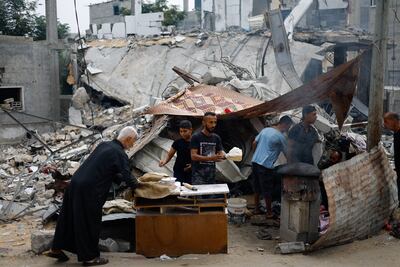The pace of developments in the Israel-Gaza war has been distressing. Last week, the death toll passed 11,000 people – most of them Palestinian civilians. Meanwhile, Iran-backed militias in Iraq have launched drone attacks against US troops in Syria, a UN peacekeeper was shot in Lebanon near the Israeli border and Israel's security cabinet has approved regulations to close foreign broadcasters. With these events as a backdrop, an emergency summit of the Arab League and the Organisation of Islamic Co-operation was convened in Riyadh.
The conflict’s complexity has not hindered an enormous resurgence of interest in the Palestinian cause. However, as millions march for a ceasefire in capitals across the world and online exchanges become more heated and more polarised, the noise surrounding the issue can be overwhelming. It is at times like these that a return to first principles is helpful. A speech delivered in Abu Dhabi on Monday did just that.
Dr Anwar Gargash, diplomatic adviser to the UAE President, told the Abu Dhabi Strategic Debate conference that when he sat down to draft his keynote speech, he had planned to focus on the UAE and its priorities of stability and prosperity. The Israel-Gaza conflict, which he described as a “horrific and profound setback”, changed all that.

In his address, Dr Gargash cut through the equivocation coming from some quarters when he said that the taking of civilian life by Hamas on October 7 was unjustifiable as was Israel’s “disproportionate” response in repeatedly bombing the Gaza Strip. In calling for an immediate ceasefire, Dr Gargash reinforced the same call that came from the Arab and Muslim states that met in Riyadh over the weekend. A rapid halt to the death and destruction was also integral to Dr Gargash’s next point: that it is vital to ensure war does not spread regionally.
But perhaps the insight that provided the most clarity was Dr Gargash’s point that any war must be resolved through politics. In the case of Israel and Palestine, it is unfortunate that the most logical solution to the conflict – two states living side by side in security and stability – seems so far away. Nevertheless, any approach that fails to deliver Palestinians an independent state of their own, or that condemns them to perpetual second-class status is one that is doomed to failure. Dr Gargash is right to say that the spread of violence has revealed the failure of the “policy of containment” imposed on the Palestinians and that it would be an “epic, historical tragedy” to not re-engage politically on the issues of borders, refugees and East Jerusalem.
In a conflict with so many moving parts and geopolitical repercussions, it can be difficult at times to see through the destruction to find a way out. At the Abu Dhabi Strategic Dialogue yesterday, a clear-eyed perspective was offered: attacks on civilians are wrong; there must be an immediate ceasefire; the region must be spared the threat of wider conflict and – perhaps most importantly – there is no security solution to this deadly situation; only one that establishes a Palestinian state alongside an Israeli state will guarantee peace and stability.


